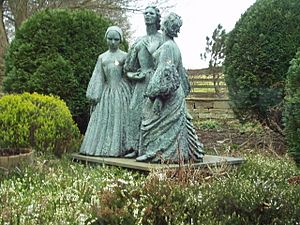Jocelyn Horner facts for kids
Quick facts for kids
Jocelyn Horner
|
|
|---|---|
| Born | 1902 |
| Died | 1972 (aged 69–70) Halifax, West Yorkshire
|
| Nationality | British |
| Alma mater | Leeds School of Art |
| Known for | Sculpture |
Jocelyn Horner (1902 – January 1973) was a British sculptor and teacher. She was known for creating beautiful sculptures. She also helped teach art to many students.
Contents
Early Life and Education
Jocelyn Horner was born in 1902 in Halifax, West Yorkshire. She lived most of her life in a house called Green Hayes. She went to Halifax High School. Later, she studied at Grovelly Manor in Bournemouth.
In 1920, Jocelyn started studying art. She went to the Leeds School of Art to become a sculptor. While she was there, she studied with famous artists. These included Barbara Hepworth and Henry Moore. Even as a student, Jocelyn began making sculptures of animals. She also created portraits of children.
Work During World War II
During World War II, Jocelyn Horner helped her community. She worked as a home teacher. She taught blind people in Halifax. She also volunteered as a nurse. She worked for the Red Cross.
Teaching Career
After the war, Jocelyn returned to Leeds. She continued her studies there. In the early 1950s, she started teaching art. She taught part-time at different colleges.
Jocelyn taught modelling and wood carving. She taught at Percival Whitley College. She also taught at Halifax Art College. She shared her skills with many young artists.
Notable Sculptures and Recognition
In the 1960s, Jocelyn Horner's sculptures became well-known. Her art was shown in Yorkshire and across the country. She was influenced by the artist Jacob Epstein.
Jocelyn won the Leeds Gold Medal in 1951. This award was for artists from Yorkshire. She also received important requests for her art. One famous work is a bronze sculpture. It shows the three Bronte sisters. This sculpture is at the Brontë Parsonage Museum.
She also created a sculpture of Sir John Barbirolli. It was a bust (head) and hands. This piece was made for the Hallé Concert Society in Manchester. Another important work is her Head of a Blind Man. This sculpture is kept at the Royal National Institute of Blind People in London.
Legacy and Memorials
The Leeds City Art Gallery has some of Jocelyn Horner's artworks. After she passed away, a special show was held. It was a memorial exhibition at Temple Newsam near Leeds.
In 2013, a special Blue Plaque was put up. It is on the house in Green Hayes where Jocelyn was born and died. This plaque honors her life and work.


